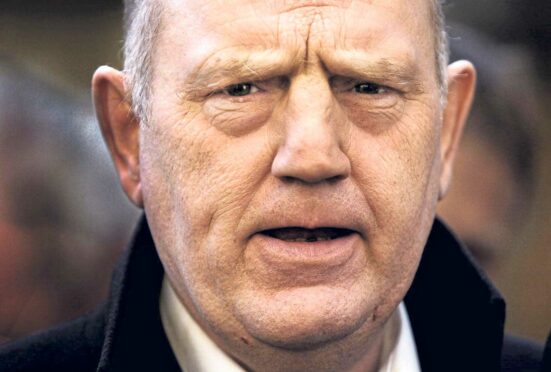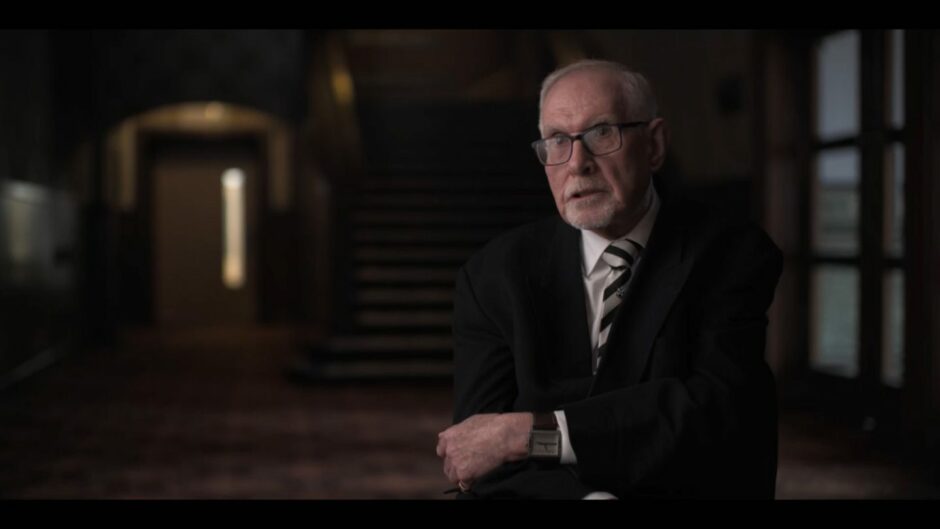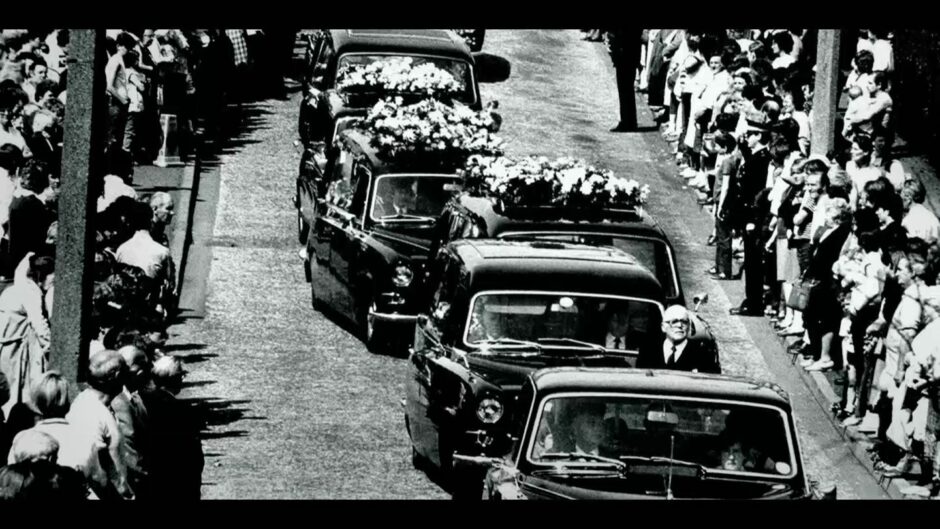
A man cleared of the notorious Ice Cream Wars fire attack that killed six people in 1984 was involved, according to new interviews.
Trial witnesses speaking in a two-part documentary detailing the murders suggest Thomas “TC” Campbell was complicit when a flat in Glasgow was deliberately set alight.
Campbell and Joe Steele were convicted of killing six members of the Doyle family in 1984. The men had two appeals rejected before finally having their convictions quashed in 2004, in one of Scotland’s most notorious miscarriage of justice cases.
But a new BBC documentary, called The Ice Cream Wars, questions the innocence of Campbell, who died in 2019. Archie McDougall, company secretary of ice cream firm Marchetti Brothers, which owned 37 vans across Glasgow’s East End during the height of a turf war between drivers over the most lucrative routes, reveals he always believed Campbell was involved.
Speaking for the first time since he gave evidence during the 1984 trial, McDougall reveals: “Personally, I was surprised that Thomas Campbell was maintaining his innocence.
“From my point of view, he was behind it from the start. Ice cream van drivers said they were being heavily threatened with violence by Thomas Campbell. I wouldn’t like to comment specifically on who lit the match outside the Doyle family home, but I’m quite convinced in my own mind that Thomas Campbell was behind it.”
McDougall also dismisses suggestions that vans were being used to sell drugs around the city’s estates. He said: “I never ever found any evidence of drugs being sold. I regularly did spot checks on drivers and vans and never found a single one with drugs.”
Campbell had bought an ice cream van but because of his long criminal record – he was described in the documentary as having “slashed and stabbed his way through Glasgow” – the operators licence for the vehicle was in his then wife’s name. McDougall adds: “It was well known that TC was intimidating other drivers.”
Another gangster and long-time associate of Campbell, Tam McGraw, known in the underworld as The Licensee, has been accused of ordering the fire, which killed six members of the Doyle family, including an 18-month-old baby. McGraw, who is also dead, had an alibi for the night of the blaze in Glasgow’s Bankend Street.
Les Trueman, a former detective, tells the documentary that when he arrived at the scene of the blaze, Andrew Doyle said to him : “Right, you know who did this, Les. You know who did it. He was obviously angry. But when I asked him who, he just wouldn’t say.
“I had no doubt at all he was referring to TC Campbell and McGraw.”
In the BBC documentary, Steele is asked who ordered the murders and answers: “Tam McGraw. And it took me a long time to even come out with that. But why should I protect a rat who has put my life through what he did. And other people’s lives. Aye, he ordered it. I believe he ordered it. I’m an innocent man and I will be an innocent man until the day I die.”
The two-part documentary also raises fresh concern around the conduct of senior police officers during Scotland’s biggest ever criminal trial. Glasgow’s most senior detective, Charlie Craig, is described as “a closer not an investigator”.
The documentary questions his methods as well as the miscarriage of justice in another notorious case, the 1982 jailing of Raymond Gilmour, who served 20 years in prison for the murder of Pamela Hastie. Gilmour, a teenager at the time, claimed he had been coerced into admitting the crime. In 2007 the appeal court ruled the original trial verdict unsafe and released him.
Craig had replaced the senior officer in charge of the Pamela Hastie case who had dismissed Gilmour’s so-called confession. Gilmour’s lawyer told the documentary that Craig “set about proving that there was evidence to prove the confession” and during the journey to the police station, it was claimed the suspect also supposedly confessed to the officers driving him, just like Campbell and Steele allegedly had.
Craig is now dead. Meanwhile his colleague, Superintendent Norrie Walker, who is also dead, is named by witness Billy Love who claimed he had been forced by the officer to sign a false statement about Campbell’s involvement in the Doyle murders. Love later admitted he had given a false statement.
Steele tells the programme: “When Charlie Craig and Norrie Walker questioned me, they admitted they knew I hadn’t done it, but it was up to me to get out of it. They said “help yourself by helping us. Refusing to lie and say I was guilty meant I would never accept parole. It destroyed me and my family, and every single day I still think of the Doyle family never getting the truth.”
Robert McInnes, a former detective in the Serious Crime Squad, says: “There was never enough evidence there. But I can see why they would be pressurising them to get a conviction. It was a terrible crime.”
Trueman adds: “It’s not terribly professional, but you don’t know the circumstances. There’s a lot of people who would give you a statement but they don’t want to sign it. Others would tell you something but they don’t want you to write it down. That’s what you are up against.”
After almost two decades, for the first time in Scotland it was ruled that the police had lied about so-called confessions.
‘At times we had to smile for the cameras but we were never friends’
Three years ago, Joe Steele told The Sunday Post how he ended his 35-year feud with co-accused TC Campbell just weeks before his death.
In an interview with chief reporter Marion Scott, who appears in the new BBC documentary, he told how the two had not spoken for years after Steele accused Campbell of undermining the fight to clear their name.
After they were wrongly convicted of the fire attack, the pair made a pact never to accept parole because that would mean admitting the murders. Steele said: “We’d made a deal with each other that we’d never accept the Special Unit, which was cushier. We’d do hard time.
“But when TC reneged on the deal and went to the Special Unit we fell out badly and that continued for years, even though we were thrown together as we campaigned to be cleared.
“There were times when we had to smile for the cameras but we were never friends. If we were, it was a friendship forged in hell. We hated each other. But I am glad we made up just before he died. I realised the anger was just another part of the burden I was carrying over what happened, so I feel better for pushing it aside.”
Steele revealed he also prayed for the Doyle family every night of the 18 years he spent in jail. He said: “I still pray for them to this day.
“What happened to that innocent family was beyond cruel. I stood watching their funeral procession and the streets were lined with people crying. I remember saying a prayer for them as the hearses passed me in the street, never imagining that days later I’d be arrested for their murder.
“My family knew I was innocent but I’ve spent the rest of my life hoping the Doyle family eventually believed that too. It’s been a huge burden and even after the appeal court proved I was innocent, fitted up by the police, there will be people who still suspect I was involved.
“It was a relief my mum went to her grave after the appeal court cleared my name and she could tell everyone that.”
The Ice Cream Wars is on BBC1 tomorrow and Tuesday at 9pm

Enjoy the convenience of having The Sunday Post delivered as a digital ePaper straight to your smartphone, tablet or computer.
Subscribe for only £5.49 a month and enjoy all the benefits of the printed paper as a digital replica.
Subscribe © SYSTEM
© SYSTEM © SYSTEM
© SYSTEM © SYSTEM
© SYSTEM © DCT Media
© DCT Media